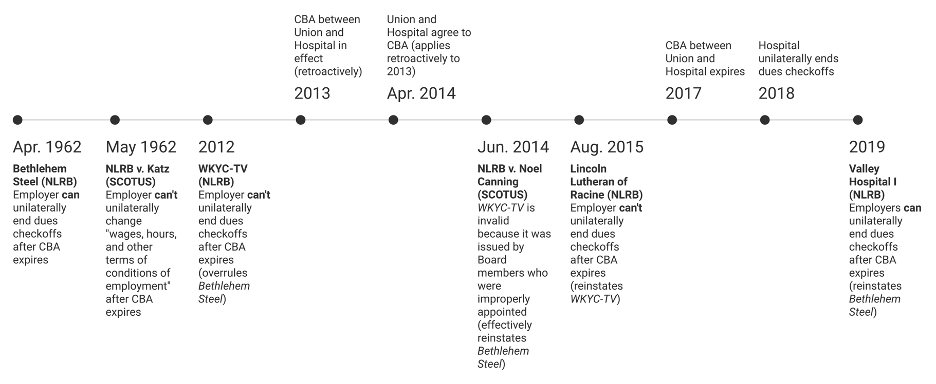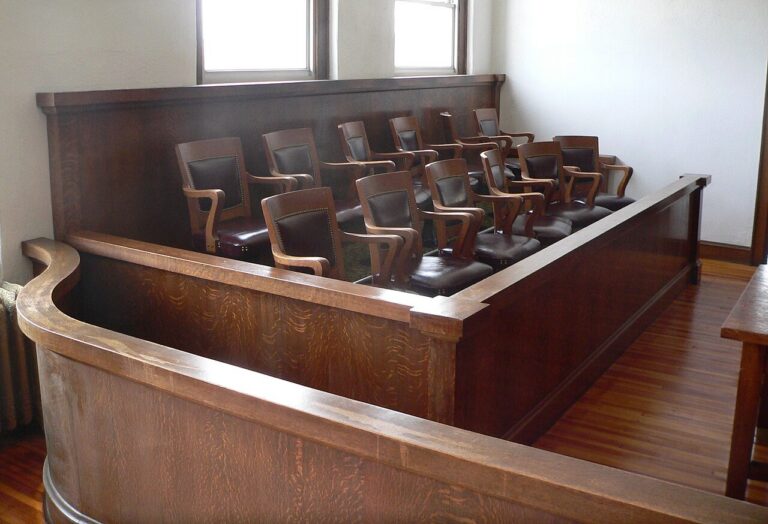
Will Ebeler is a student at Harvard Law School.
Many collective-bargaining agreements have automatic dues-checkoff provisions that require the employer to automatically deduct union dues from the paychecks of employees who authorize the deduction. These provisions are crucial for unions to maintain their funding flow; without automatic dues checkoffs, the other option is for members to directly pay their dues, which adds friction to the dues-paying process and ensures less-regular funding for the union.
While a steady cash flow is always important, it can be even more so during contract negotiations; dues help pay for negotiation costs, fund worker-organizing efforts, and maintain strike funds, all tools that can help unions exert leverage during bargaining. Employers recognize the importance of dues and dues checkoffs and historically have sought to use the termination of dues checkoffs as leverage in the bargaining process.
This fall, the National Labor Relations Board ruled in Valley Hospital Medical Center, Inc. (Valley Hospital II) that employers cannot unilaterally stop deducting dues from employees’ paychecks after a CBA expires. This decision will help ensure that employers can’t starve unions of resources during bargaining.
Background
Culinary Workers Union Local 226, a member union of UNITE HERE, represents 90 housekeeping, cooks, cashiers, kitchen workers, and stewards at Valley Hospital Medical Center. In 2014, the union and hospital agreed to a CBA to apply retroactively from 2013 through the end of 2016. That CBA included a “Check-Off Agreement” by which Valley Hospital agreed, “during the term of the Agreement,” to deduct union dues from employees who had submitted an authorization that they could revoke in a yearly period or after the CBA expired.
In January 2017, the CBA expired and by early 2018, Valley Hospital and the union had not yet reached an agreement on a new contract. On January 26, 2018, Valley Hospital provided notice to the union that it would be unilaterally ending dues deductions five days later, on February 1, 2018. In response, the union filed a complaint with the NLRB.
After an Administrative Law Judge dismissed the complaint and the union appealed to the Board, the Board (in Valley Hospital I)affirmed the ALJ’s dismissal, concluding that employers could unilaterally terminate dues checkoff programs after a CBA expires. The union appealed the Board’s decision to the Ninth Circuit. The Ninth Circuit pointed out that the Board had not addressed several other Board precedents that were inconsistent with its reasoning in Valley Hospital I and remanded the case so the Board could explain its departure from those precedents.
The NLRB’s Decision
On reconsideration, the Board announced that dues checkoffs cannot be unilaterally terminated after a contract expires. It first explained the general rule, established by the Supreme Court in its 1962 case NLRB v. Katz, that employers violate the National Labor Relations Act when they “unilaterally change[] represented employees’ wages, hours, and other terms and conditions of employment” without giving the union an opportunity to bargain about the changes. It also stated the settled principles that Katz applies even after a CBA expires and that dues checkoffs are related to “wages, hours, and other terms and conditions of employment.” The question for the Board, therefore, was whether dues checkoffs are an exception to the Katz rule; it concluded that they are not.
First, the Board explained that dues checkoffs are unlike other exceptions to the Katz rule. Some exceptions are based in statutory restrictions. For example, under the National Labor Relations Act, union-security provisions, which require every employee at a company to pay a portion of union dues, are only authorized for as long as the employer and union agree to the provision, so employers cannot require employees to pay dues after the expiration of a CBA. By contrast, dues checkoffs do not require an agreement between a union and employer; an employer can independently choose to deduct dues from consenting employees. Board precedent had, for several decades, considered union security and dues checkoffs to be interdependent, possibly because dues checkoffs are often addressed in “Union Security” clauses and can be a way of enforcing union security. However, the Board explained here that dues checkoffs are fundamentally independent from union security, as illustrated by the fact that dues checkoffs exist even in right-to-work states where union-security clauses would be unenforceable. Thus, dues-checkoff clauses can survive the expiration of a CBA even if union-security clauses don’t.
Other exceptions to the Katz rule, such as no-strike clauses, involve a waiver of a party’s rights and are only enforceable for as long as a party has agreed to waive that right. The Board explained that dues-checkoff provisions do not involve a waiver of a right — they are simply a system to establish administrative convenience for the union and employees — so they don’t follow the same logic.
Having established that dues checkoffs are unlike existing exceptions to Katz, the Board next showed how they are similar to provisions that do survive contract expiration, such as voluntary payroll deductions for union benefits funds. The key elements of voluntary deduction provisions are first, that they are matters of administrative convenience, and second, that they are subject to individual employee authorization and revocation. Because dues checkoffs have both of those elements, they are analogous to other voluntary deduction provisions, and the Board concluded that dues-checkoffs should survive contract expiration like those provisions.
The Board then decided to apply the change in law (from Valley Hospital I) retroactively to the hospital because of the reliance interests involved. The hospital’s actions were illegal when it ended dues checkoffs, so the hospital could not have relied on the Board’s past policy. In addition, when the union and hospital were negotiating in 2014, employers could not unilaterally end dues checkoffs after CBA expiration. The Board concluded that the union could have relied on that policy in negotiations, and that this reliance weighed in favor of retroactive application.
The Board also signaled its intent to apply the standard to other cases where an employer acted after Valley Hospital I. Board policy has shifted somewhat regularly in the past ten years (as seen by the below timeline), and the Board concluded that employers who had unilaterally ended dues checkoffs in the wake of Valley Hospital I could not have relied on that standard enough to justify a purely prospective holding here.

Conclusion
Valley Hospital has appealed the Board’s decision to the Ninth Circuit. As of August 2022, Valley Hospital and the union had still not reached an agreement on a new CBA, nearly six years after the expiration of the previous CBA. It is unclear whether Valley Hospital II will help resolve the disagreements between the hospital and the union; Culinary Workers Local 226 has 60,000 members of which only 90 work at the hospital, so it is unlikely it was facing a shortage of resources to negotiate this contract. However, if Valley Hospital II is upheld, it will be an important victory for unions and will help ensure that employers can’t use the continued payment of dues as leverage to force a union to concede on crucial bargaining issues.










Daily News & Commentary
Start your day with our roundup of the latest labor developments. See all
February 23
In today’s news and commentary, the Trump administration proposes a rule limiting employment authorization for asylum seekers and Matt Bruenig introduces a new LLM tool analyzing employer rules under Stericycle. Law360 reports that the Trump administration proposed a rule on Friday that would change the employment authorization process for asylum seekers. Under the proposed rule, […]
February 22
A petition for certiorari in Bivens v. Zep, New York nurses end their historic six-week-strike, and Professor Block argues for just cause protections in New York City.
February 20
An analysis of the Board's decisions since regaining a quorum; 5th Circuit dissent criticizes Wright Line, Thryv.
February 19
Union membership increases slightly; Washington farmworker bill fails to make it out of committee; and unions in Argentina are on strike protesting President Milei’s labor reform bill.
February 18
A ruling against forced labor in CO prisons; business coalition lacks standing to challenge captive audience ban; labor unions to participate in rent strike in MN
February 17
San Francisco teachers’ strike ends; EEOC releases new guidance on telework; NFL must litigate discrimination and retaliation claims.